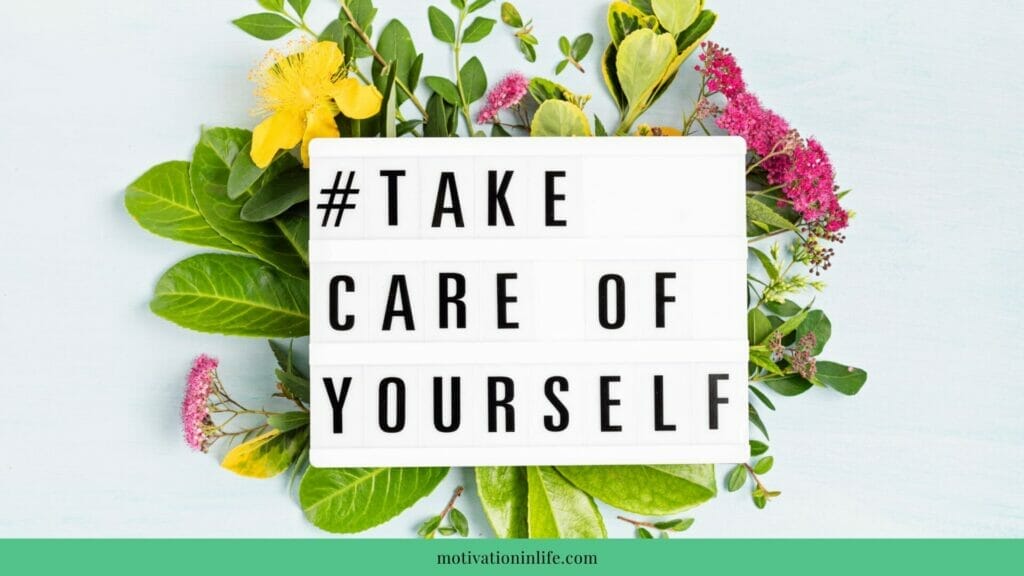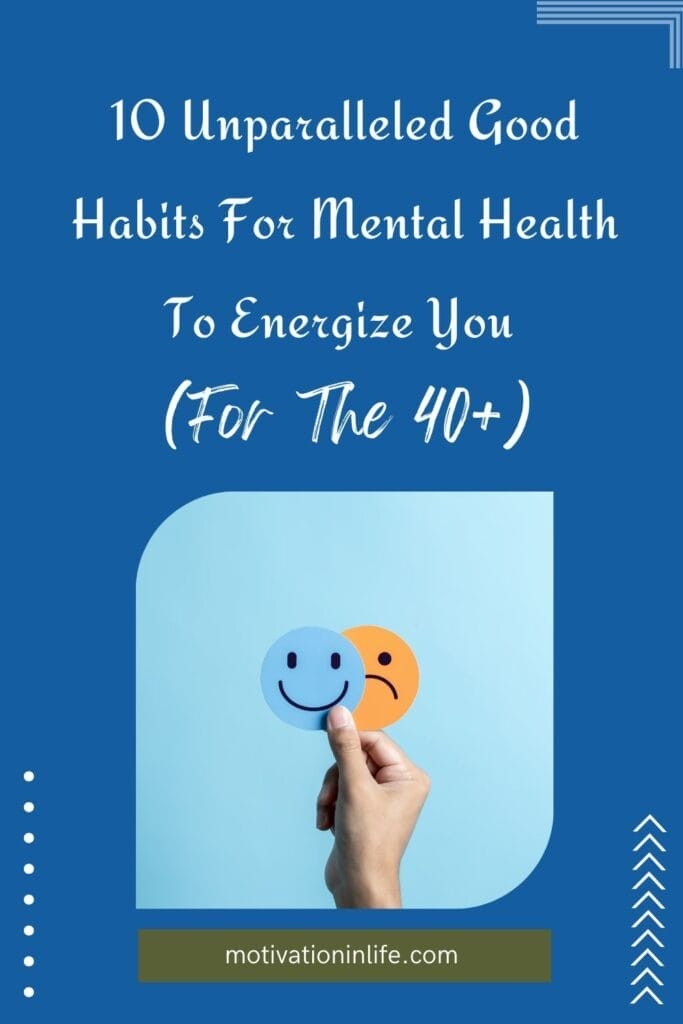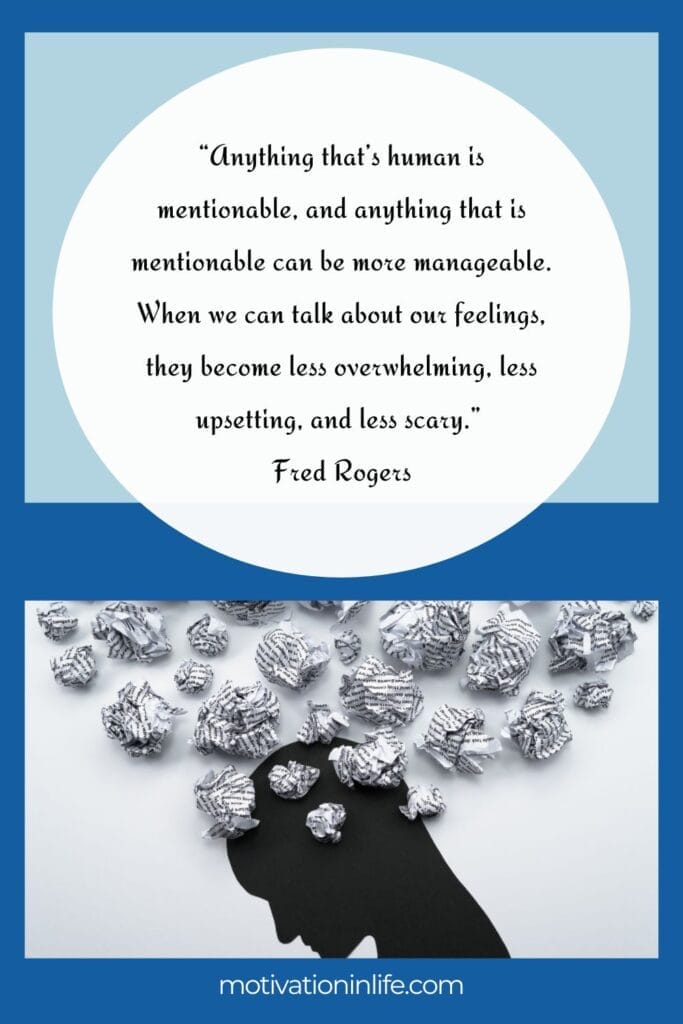Taking care of your mental health becomes increasingly important as you grow older. Establishing good habits can make a significant difference in how you feel and function daily.
Here are ten simple yet effective habits that can boost your energy and improve your mental well-being, especially for those over 40. Let’s explore these habits and see how they can positively impact your life.
From creating meaningful bonds and connections with your loved ones to establishing sound sleep routines, these good habits for mental health will help you develop the mental resilience needed to face every situation in your life.
Table of Contents
This post may contain affiliate links and if you click on them we may earn some commissions.

10 Good Habits For Mental Health In Life After 40
Having good habits for mental health is the key to long-lasting happiness. It is essential to develop healthy mental habits to improve your overall health and mental well-being, especially beyond your 40s.
Mental toughness, or the ability to persevere through mentally challenging situations, emotions, and more, is a valuable goal you should strive to achieve for mindset mastery.
When you’re mentally tough, you’re able to work through situations that threaten the well-being of your mental health. After you hit your 40s, consider developing these ten power habits to develop a stronger sense of mental toughness.
So let us look into some of the most effective habits you can start practicing today for mental resilience. By consistently making these good mental health habits a part of life, you can experience an improved sense of clarity and stability between your mind, body, and soul.
Being Grateful for all you have in life is another great habit to strengthen your mental health. We have designed a Daily Gratitude Journal for you using the templates from Creative Fabrica.
Download it to begin your journaling journey today!!
Practice Resilience When Faced With A Difficult Situation
Resilience, or the ability to quickly “bounce back” after facing a setback or difficult situation, is an excellent habit to have if you want to develop more mental toughness.
Practice “bouncing back” after something bad or negative happens instead of moping or wallowing in tough emotions. Many people discover that resilience is like a muscle — the more you work it, the stronger it becomes.
Having said so, bouncing back is easier said than done. So, depending on the situation at hand, allow yourself the time required to grieve or cry out if you feel like it. Yet, try to get back to normalcy after recuperating.
Read our post on 51 Positive Quotes About Moving On For Unbelievably Terrific Life (For The 40+) for a dose of inspiration in case you need some push and motivation when you are facing a tough time in life.
Develop A Mantra To Use When You’re Struggling With Your Mental Health
Using mantras is another great habit for developing mental toughness. Mantras or affirmations are those phrases that you can repeat to get your thoughts realigned with your main focus or goals.
They are excellent to use anytime you’re struggling to keep your mind and spirit on the right track.
Some examples of good mantras you can use to work through a challenging situation include :
- I can do hard things.
- I’ve been through tough situations before, and I can do it again.
- I have the power to do good.
- I can make smart choices
The technique of visualizing what you affirm is a great way to make your affirmations come true. Read our blog post on How To Reprogram The Subconscious Mind To Improve Yourself (For The 40 +)

Reach Out To Your Support System When You Need Extra Help
A great way to stop sweating the small stuff is to voice your concerns to someone you know and trust. Get into the habit of asking for help when you need it.
Instead of suffering alone with excess worry and anxiety, call on someone you trust to be a kind ear. Often, your trusted friends or family members make great sounding boards for hearing your concerns and then helping you work through them logically.
There is never any shame in asking for help when you need it. Knowing when to reach out to another person for support is one of the best things you can do to sharpen your sense of mental toughness.
For instance, when I have problems in my blogging journey, I always seek out the help of my fellow bloggers in the PIPS VIP group, which is a very helpful community of bloggers founded by Sadie Smilie who are always ready to help me when needed and help me retain my mental peace.
Yet you should be sure that the person you open up to is worthy of your trust and will not manipulate your situation later on.
Asking for help can be challenging. At times, people feel like they’re being too weak when they ask for help. In reality, leaning on your support system is a great way to fortify your mental health, especially in times of hardship.
Speak To Yourself With Kindness
The way you speak to yourself has the power to greatly affect your overall mental health. Get into the habit of speaking to yourself with kindness. Doing so is one of the best, most positive ways to make yourself mentally tougher.
Even when the world seems to be against you, if you feel like you can trust yourself to show yourself kindness, you can work your way through any situation, no matter how difficult it may be.
Especially as you age, you tend to get tough with yourself, so it becomes all the more necessary to remind yourself to be soft towards yourself.
Therefore, make it a habit to take care of the way you treat yourself each day and see if that makes a difference to your overall mental health conditions.
“You cannot be lonely if you like the person you’re alone with.” — Wayne Dyer
Practicing self-care is a nice way to nurture yourself. Read our blog post on Simple Self-Care Practices For Impactful Positive Change In Life (For The 40 +) to learn more about how taking care of yourself is so worthwhile in your midlife.
Challenge Your Negative, Anxious, And Worried Thoughts And Measure Them Against Reality
Do your thoughts tend to be negative? When you’re feeling anxious or stressed, is it difficult for you to divert your thinking toward anything that isn’t your current source of worry?
If you struggle with many anxious or stress-induced thoughts, get into the habit of measuring them against reality. Often, you’ll discover that a lot of anxiety-induced thinking rarely aligns with fact, truth, and reality.
Once you start to question these anxious thoughts, you’ll notice yourself sweating the small stuff less and less frequently.
Getting into the habit of challenging your negative thinking would be a great habit to develop as a way of strengthening your mental toughness. Challenging your thoughts can be difficult, so it may take lots of practice and patience to perfect.
The next time you experience a series of negative thoughts, practice comparing those thoughts to your actual reality. More often than not, you’ll likely realize that your worries and stressors are coming from a place that is more imaginative than realistic.
Read our blog post on 10 Really Helpful Benefits Of Self-Reflection To Energize The Mind (For The 40+) which will help you reflect on your thoughts and help you do away with your negative thought process.

Use Deep Breathing Exercises To Regain Control Of Your Body And Mind During A Stressful Time
There is a major reason why meditation practices have used deep breathing exercises for thousands of years across multiple cultures: they are effective!
If you catch yourself being worried about the little things in life often, pick up the power habit of using deep breathing exercises to regain control of your body and calm yourself.
Taking in some deep, measured breaths, holding them, and then slowly releasing them forces your body to physically slow down; this includes calming your mind, your heart rate, and more.
Once you have your body and mind under control, you can focus more easily on reality instead of your stressful thoughts.
Another great way to sharpen your sense of mental toughness is to reconnect with your breathing patterns when you’re feeling out of control.
For example, when you find yourself in particularly stressful situations, get into the habit of walking away momentarily and practicing some deep breathing exercises.
By focusing on regaining control of your breathing, you also get your thoughts and other bodily processes back in order.
Being able to regain control of your breathing helps you develop mental toughness because it helps you move past racing thoughts and that uncomfortable: “out of control” feeling.
Here is a great post by my fellow blogger, Sara Modlin 11 Mindfulness Exercises That Can Help You Transform Your Life with Chronic Pain which can also benefit you in dealing with stressful situations beyond your 40s.
Practice The 3-3-3 Rule To Quell Anxious Thoughts And Worries
A great way to stop anxious thinking and panicking over the small stuff is to practice the 3-3-3 method. To use this method, do the following when you feel worries and anxiety taking over your thinking:
- Name three things you can hear
- Name three things you can see
- Move three different parts of your body.
By doing these simple exercises, you interrupt your anxious thinking cycle by bringing yourself back into the present moment. Learn to live in the now. It is the best way to improve your mental well-being.
Remind Yourself That Making Mistakes And Failing Is Normal And Perfectly Okay
After making mistakes, many people tend to linger on them long after they’ve occurred. Rather than allowing themselves to move forward and continue living their lives, they may ruminate on their mistakes, not allowing themselves to learn and grow from what happened.
Instead of allowing mistakes to make you sweat, get into the habit of accepting that mistakes are a natural and normal part of being human. The sooner you can accept this, the easier it will be for you to let go of your mistakes and stop sweating them every time you make them.
Mistakes and failures are going to happen. Experiencing them is a totally normal (albeit uncomfortable) part of human life.
Your past does not determine your future. Especially when half of your life is behind you, when you look back, you are bound to reflect on your mistakes and failures. Yet, it is important to get into the habit of reminding yourself that it is okay to make mistakes and fail.
Even though failure doesn’t feel great when it happens, it’s not unusual. Life will eventually move forward, and it will move forward again quickly if you develop mental toughness by accepting failure and mistakes as a normal part of living. Learn to let go of your past.
Practice pulling the main lesson learned out of any mistake or failure you experience. Read the book “Failing Forward: How to Make the Most of Your Mistakes”, by John C. Maxwell, where he teaches how to make the most of your mistakes to achieve success.
Get into the habit of finding the main lesson you can learn from every mistake or failure you experience. It’s easy to get caught up in the big emotions that often accompany failing or making mistakes; it can wear on you for days, weeks, and even years after the failure or mistake happens.
Instead, you can bolster your sense of mental toughness by extracting the lessons you learned from the experience and then moving forward with life.
Read our post on How To Reinvent Yourself By Eliminating Your Fears (For The 40+), which will help you learn how to be in control of your fears when you are trying to process your mistakes or failures.

Let Yourself Feel And Experience Your Emotions In Real-Time
One of the best habits to form if you want to develop a stronger sense of mental toughness is learning how to process your emotions in real-time.
Big emotions aren’t fun to handle, especially if you’re struggling with emotions like grief, sadness, anger, frustration, or fear, which you are bound to encounter as you age.
Rather than giving in to the temptation to hide or ignore these big feelings, get into the habit of actually letting yourself feel and experience them.
Not only will you connect with yourself on a much deeper level, but you’ll also process your big feelings more effectively, bringing relief to your mental health.
Get into the habit of looking for the truth in every scenario you imagine or face. If you practice looking for the truth in every scenario and situation, you will most likely realize that your anxieties and worries are rarely based on reality.
After practicing this habit a few times, you’ll be able to analyze your anxieties and worries through a critical lens that makes them seem a lot less scary.
Read our post on 10 Actions For Emotions Mastery To Navigate Change And Uncertainty (For the 40+), which will help you learn how to be in control of your emotions amidst the changes that you face.
Allow Yourself To Accept Criticism Gracefully
Receiving criticism is tough. It can be hard to hear someone criticize something about you or the work you’ve done.
However, criticism holds a lot of value — often, it can be used as a blueprint for making much-needed improvements to yourself, your work, and more.
Get into the habit of accepting criticism gracefully rather than becoming defensive about it. This helps you develop mental toughness
Validate Your Thoughts And Feelings
It is much easier to stop getting worked up about the little things in life when you validate your thoughts and feelings. Even if you are fretting about minor goof-ups, it’s essential to substantiate the way you’re thinking and feeling about them.
Get into the habit of validating your feelings, even if you feel like you are overreacting. There is likely a reason why you get worried about little things in life, and admitting that you have a problem with it is the first step toward squashing that excess worry.
Here is a blog post that will inspire you to think positively. Go through these 51 Daring Quotes To Think Positive In the World (For The 40+) for a dose of inspiration.

Fun Activities To Improve Mental Health
When we talk of mental health, we often tend to get serious. Yet mental health need not be a chore.
You visit the gym or take up activities like cycling or running to maintain your physical health and to make it interesting; likewise, there are several fun activities that you can get involved in to harness your mental health.
Use a small notebook or journal as a “brain dump” for worrisome or anxious thoughts.
When your hands are full, you may feel like there are thousands of little thoughts clouding your thinking, and often, all those little thoughts are stopping you from actually focusing on what you need to get done.
If this sounds familiar, consider using a journal as a place to “brain dump.” Write down those little thoughts as they occur; this way, you can revisit them later when you have time, allowing you to stop being bothered about everything in your mind and focus on what is most important at the moment.
We have a post on journaling ideas for beginners and journaling for self-improvement and you can use the tips mentioned to start journaling, which is one of the very good habits for mental health.
If you want to buy some cool journals for yourself, you can try Creative Fabrica which has excellent journals and planners. If you want to design your journals or planner, you can also try Canva.
Canva is a web-based tool that can help you enhance your creativity and hone your design skills, even if you know nothing about designing.
Further, if you like Canva and want to take your skills further, my fellow blogger Pam Allen has an excellent membership called the Canva Clubhouse, where she teaches design skills to women entrepreneurs and teaches how to work on Canva.

Develop New Hobbies
Normal routine life can be stressful, and it can also become monotonous at the same time. Taking care of the family, and your profession can seem like a daunting task.
So building new hobbies or nurturing hobbies you had during your younger days can be a great boost to your mental health. It induces positivity into your life, makes you feel happy, and acts as a breath of fresh air in your otherwise mundane life.
Finding creative outlets like painting or writing can be beneficial for helping channel negative energy into something productive.
Maintain a good, consistent sleep schedule
Getting enough good quality sleep is an essential part of controlling your worries and anxieties. When you are feeling well-rested, you are far less likely to sweat the small stuff in life.
Being too tired causes you to feel frustrated and on edge, which is the perfect storm for excessive worry and anxiety to form. So per night, create a sleeping habit that can induce better sleeping patterns.
Use Tools Such As Calendars And To-Do Lists To Keep Your Life More Organized
A great way to eliminate excess worry from your life is to keep yourself organized. Get into the habit of using tools like calendars and to-do lists to keep your priorities and schedule in check.
You can use tools like Google Calendar or Notion to help you prioritize your list. I found this notion course extremely helpful to get started with using Notion.
If you procrastinate a lot and that is hampering your progress in life, you can look at these apps for procrastination to help you overcome the habit.
If you know exactly what you need to do and when, you’re far less likely to worry about forgetting (or, worse, actually forgetting) something important that would otherwise cause you concern.
You can get this intentional week success guide, which is an actionable guide that will help you create a weekly plan and enhance your productivity.
Good Habits For Mental Health: Key Takeaways
Good habits for mental health are important for a healthy and happy life. Taking time to nurture and build on your healthy mental habits will help you feel more connected to your true self.
You will feel less stressed out in demanding situations and address the issue with more maturity and confidence, whatever it be.
Taking care of yourself is an important aspect of your life you tend to ignore. But as the saying goes, if you do not take care of yourself, you cannot continue to take care of anyone else for very long, especially beyond your 40s!!
IF YOU ENJOYED READING THIS POST, PLEASE PIN ONE OF THESE IMAGES BELOW!
I will be grateful for your kind gesture. Thank you!




